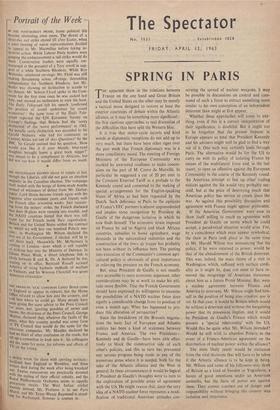SPRING IN PARIS
THE. apparent thaw in the relations between France on the one hand and Great Britain and the United States on the other may be merely a tactical move designed to restore at least the exterior courtesies of debate within the Atlantic alliance, or it may be something more significant: the first cautious approaches to real discussion of the difficulties that have split the Western bloc.
It is true that motor-cycle escorts and kind words at diplomatic receptions do not add up to very much, but there have been other signs over the past week that French diplomacy was in a more conciliatory mood. The meeting of Foreign Ministers of the European Community was marked by unwonted readiness to make conces- sions on the part of M. Couve de Murville. In particular he suggested a cut of 20 per cent in the Common External Tariff as a prelucle to the Kennedy round and consented to the making of special arrangements for the English-speaking States of Africa as had been requested by the Dutch. Such deference in Paris to the opinions of France's EEC partners is almost unprecedented and implies some recognition by President de Gaulle of the dangerous isolation in which he now finds himself. The economic strain imposed on France by aid to Algeria and black African countries, subsidies to home agriculture, wage demands in the nationalised industries and the construction of the force de frappe has probably not been without its influence here. The putting into execution of the Community's common agri- cultural policy is obviously of great importance in relieving the pressure on the French economy.
But, since President de Gaulle. is not usually very accessible to mere economic argument, other considerations may be at work to make his atti- tude more flexible. That the French Government should have expressed its willingness to examine the possibilities of a NATO nuclear force does signify a considerable change from its position of even a month ago. What has happened to pro- duce this alteration of perspective?
Since the breakdown of the Brussels negotia- tions the basic fact of European and Atlantic politics has been a kind of stalemate between France and America. The two Presidents— Kennedy and de Gaulle----have been able effeo- tively to block the constructive side of each other's policies, and this in turn has prevented any serious progress being made in any of the numerous areas where it is needed, both for the sake of the Atlantic alliance and the West in general. In these circumstances it would be logical if President de Gaulle's thoughts- were to turn to the exploration of possible areas of agreement with the US. He might reason that, since the very idea of a NATO nuclear force represents a modi- fication of traditional American attitudes con- cerning the spread of nuclear weapons, it may be possible in discussions on control and com- mand of such a force to extract something more similar to his own conception of an independent deterrent than might at first appear.
Whether these approaches will come to any- thing, even if this is a correct interpretation of their _significance, is doubtful. But it ought not to be forgotten that the present impasse in Europe appears so total that President Kennedy and his advisers might well be glad to find a way out of it. One such way certainly leads, through Paris. The alternative would be for the US to carry on with its policy of isolating France by means of the multilateral force and, in the last resort, to open an offensive against the European Community in the course of the Kennedy round. An American attempt to line up other trading nations against the Six would very probably suc- ceed, but at the price of destroying much that American policy has striven to create since the war. As against this possibility discussion and agreement with France might appear preferable.
If the American Government were now to show itself willing to reach an agreement with President de Gaulle on terms which he could accept, a paradoxical situation would arise. For, by a coincidence which must appear symbolical, the thaw in Paris took place at the same time as Mr. Harold Wilson was announcing that his policy, if he were returned to power, would be that of the abandonment of the British deterrent. This was, indeed, the main theme of a visit to Washington which, suffused with surface cordi- ality as it might be, does not seem to have re- moved the misgivings of American statesmen about him as a future Prime Minister. But, were a nuclear agreement between France and America to intervene, Mr. Wilson might find him- self in the position of being plus royaliste que le roi. In that case, it would be Britain which would be without a deterrent and without the bargaining power that its possession implies, and it would be President de Gaulle's France which would possess a 'special relationship' with the US. Would this be quite what Mn. Wilson intended? Would he still wish to abandon Polaris in the event of a Franco-American agreement on the distribution of nuclear power within the alliance?
The most likely result would be exclusion from the vital decisions that will have to be taken if the Atlantic alliance is to be kept in being. Mr. Wilson and some of his followers may think of Britain as a kind of Sweden or Yugoslavia, a haven of good intentions under an American umbrella, but the facts of power are against them. They, cannot contract out of danger and responsibility without bringing this country into isolation and impotence.


































 Previous page
Previous page